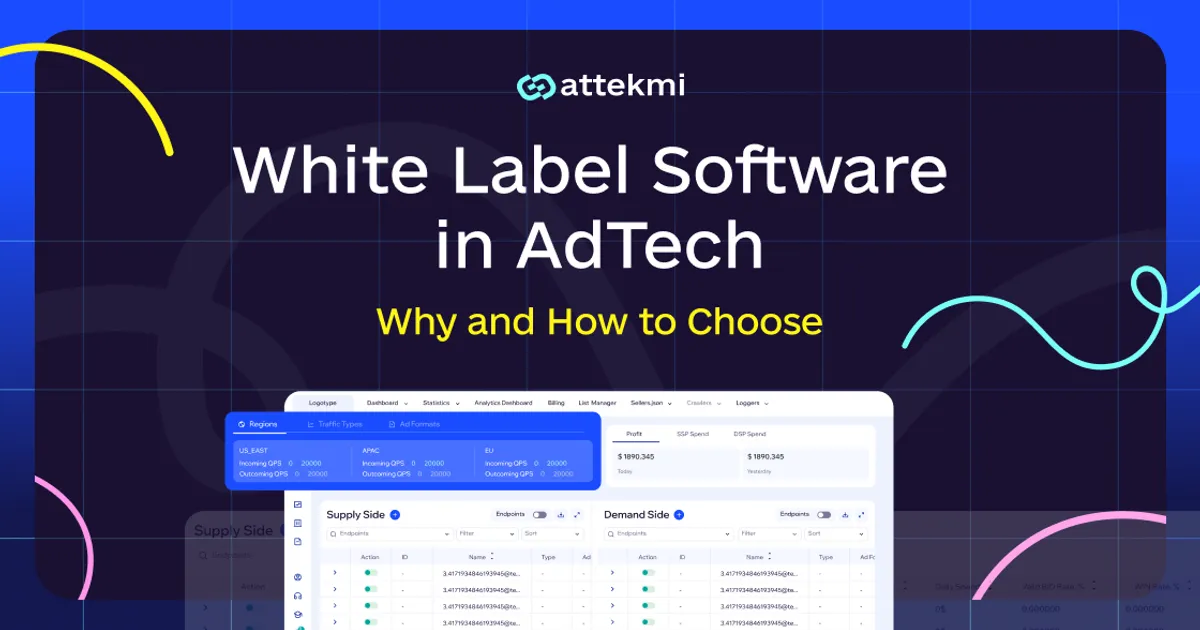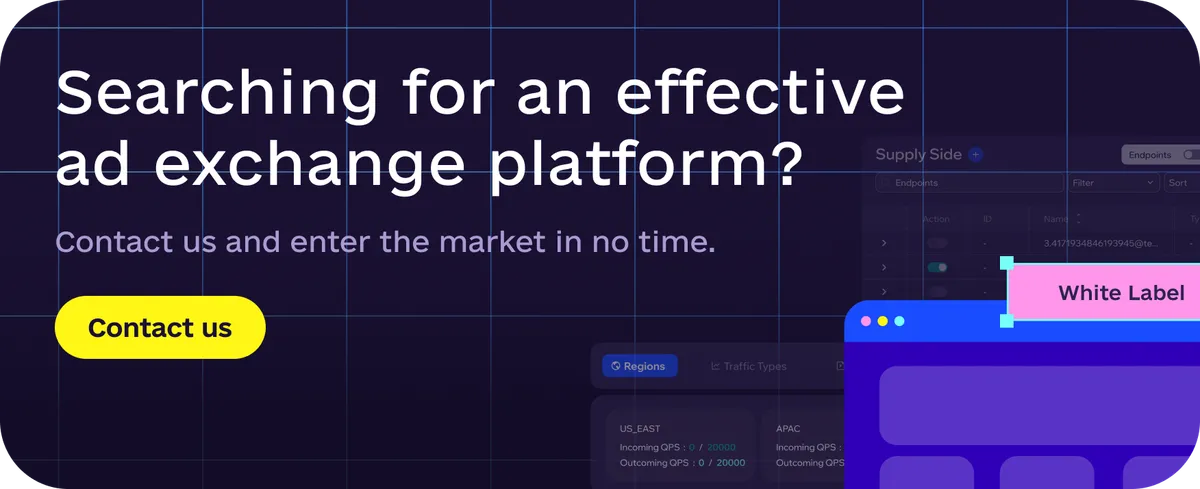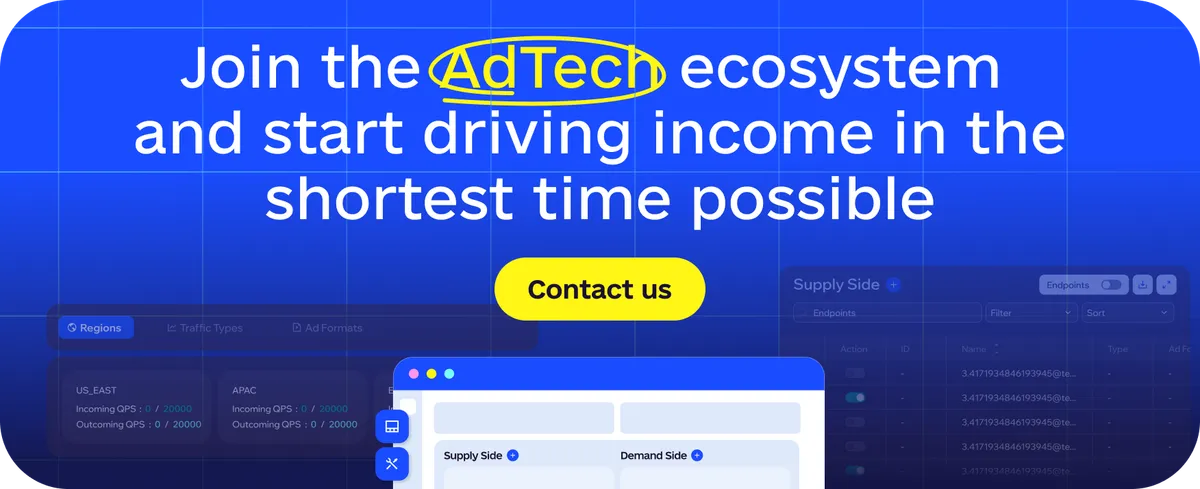The programmatic ecosystem consists of multiple components, including but not limited to supply-side platforms (SSPs), demand-side platforms (DSPs), and ad exchanges. Businesses striving for greater control over their operations or searching for growth opportunities typically aim to get their own programmatic platforms. However, developing such a solution from scratch is an expensive and time-consuming process, and that is exactly when white label software comes to the rescue.
But what are white label solutions? What is the difference between white label and private label products? What are their benefits, and how to choose the right provider? With our vast experience in white label technology, we are here to answer these questions and provide you with actionable recommendations on how to make the most of such a solution. Keep reading to learn more.
What is white label software?
White label software is a software developed by one company and used by a different business under its own brand. For instance, company A built a DSP. You, as company B, purchased this DSP and now offer it to your clients to enable them to launch programmatic campaigns. This DSP has your brand colors, logo, and key information.
Don’t confuse white label platforms with custom-built and SaaS solutions. Custom software is built from the ground up and is tailored to your specific needs. For example, if you entrust company A with developing your own DSP from scratch, that would be custom-built software, not white label.
In the case of SaaS (Software as a Service), you act as a distributor of the already built solution and resell it on behalf of the company that created it. While offering certain benefits, this approach limits your brand differentiation.
Why use white label software?
There are multiple reasons to prefer white labeling over other models, and here are the most significant of them.
Quick time to market
The main advantage of white label software is that it allows you to enter the market promptly. Yes, customization still takes some time, but the whole process is much faster than building an AdTech solution from scratch. You do not need to plan everything, design, build, and test the product, maintain it, and so on. Your solution gets branded, and you start offering it to your clients.
Cost efficiency
Since there is no need to invest in custom product development, you save not only time but also money. You do not have to hire developers with relevant experience or train your own team, if necessary – these and many other expenses are eliminated.
Risk reduction
Testing is an integral stage of any product development process. However, it can be pretty time-consuming, and there are still risks that your platform will have bugs after the release. In the case of white label software, this is not a problem. The product has already been additionally tested by other businesses that purchased it, so the risks of bugs and errors are minimized.
Key benefits of white label software for AdTech companies
Let’s get a deeper dive into the benefits of white labelling in software. For AdTech companies (and not only AdTech), the main advantages are as follows:
Business expansion opportunities
Incorporating white label software allows you to offer new services to your clients, attract new customers, and expand your business. Moreover, white label platforms are usually easy to scale, so the solution will grow together with your business.
Competitive advantage
By offering a high-quality white label product to your clients, you can gain a competitive advantage and differentiate yourself from rivals.
Access to advanced technology
Usually, choosing a white label platform does not require you to have deep technical expertise. You can access sophisticated technology without hiring in-house professionals to operate it for you. Even though having some technical knowledge will make it easier for you to understand how the platform works, you will get all the essential information during the onboarding process. Besides, in case of any difficulties, you can get in touch with the provider and ask them to clarify everything.
Greater customer engagement
By offering effective white label solutions, you can meet the diverse needs of different client groups. This can help you not only increase brand awareness and recognition but also drive customer engagement and gain loyalty.
Professional support
To remain competitive and effective, any software must be maintained and regularly updated with new features. In the case of white labeling, this is the task of the provider. In turn, you can focus on your core business operations while your solution will work without any issues.
Examples of white label software in action
To provide you with a deeper understanding of white label products and their applications, let’s review a couple of examples.
Social media management tools
Social media plays a crucial role in digital advertising, so marketing agencies often prefer the white label development option and rebrand social media tools to manage their clients’ accounts with ease. Such tools can be used for monitoring engagement, scheduling content, analyzing performance, and other tasks. Why use white label software instead of standard tools? To create a more professional brand image and build trust.
Sendible’s white label solution for social media management can serve as an example here.
AI platforms
AI is affecting a wide range of industries, and AdTech is no exception. Businesses often leverage white label AI solutions to offer analytics platforms and chatbots to their clients. While chatbots streamline interactions, AI-powered analytics solutions deliver actionable insights and enable users to make data-driven decisions more effectively.
For instance, Engati offers a white label AI agent option.
Client portals
Creating a client portal allows a brand to provide its clients with a secure online space where they can interact with the business, explore product updates, share and download important information, and so on. Choosing a white label option enables the company to get a branded portal tailored to its needs quickly and, as a result, enhance its professional image.
For example, Softr provides a white label client portal and allows clients to create a unique user experience quickly.
Email marketing tools
One more common application is white label email marketing software. By offering a branded solution to its clients, the business allows them to create, manage, and monitor campaigns in an effective and streamlined manner.
Thus, BigMailer offers a white label email marketing platform to agencies, email consultants, and other businesses.
Ad exchanges
The goal of white label ad exchanges is to enable clients to start earning on media trading in the shortest time possible. By matching the right supply with the right demand, the platform owner contributes to the programmatic ecosystem and allows advertisers to reach their audiences. Building an ad exchange from scratch is a complex and time-consuming process, as its efficiency requires an extensive array of functionalities. That is why many businesses that want to expand their operations and offer something new to their audiences prefer white label software development.
White Label Ad Exchange from Attekmi can serve as a great example here, and its efficiency is proven by multiple case studies. For instance, Mobupps achieved 371% ROI and 207% revenue growth.
How to choose the right white label software provider
There are a lot of companies offering white label software development services, so it is important to know how to make the right choice. Start with defining your goals – what do you need a white label solution for and what features do you require? Then, it is time to do some research. Here are the key things to pay attention to:
The available functionalities. First and foremost, explore the features of your potential solution to check if they meet your needs.
Customization opportunities. Some white label platforms allow businesses to customize only the UI, while others can be equipped with custom functionalities. The latter option provides a greater freedom of action. Besides, if the platform lacks certain capabilities that you require, custom feature development can solve this challenge and provide you with what you need.
Scalability. With the right solution, you can scale seamlessly as your operations expand.
Product updates. Check how frequently the solution is updated with new functionalities – regular updates can be considered a good sign as they will help you remain competitive.
The ease of integration. The solution must be easy to integrate with your existing systems, workflows, and tools.
Support. Try to get in touch with your potential white label service provider and assess their level of support – this should be enough to get a first impression. Discover the support working hours and find out if there is a knowledge base. Besides, check if they provide onboarding – AdTech solutions can be rather complex, so you may need some time to explore all the functionalities and principles of work.
Note that you may also need to check some specific aspects – this depends on what kind of solution you need. For instance, if you are in search of a white label ad exchange, prefer the platform that is compliant with GDPR and other international privacy regulations and data protection standards – in the world of growing privacy concerns, this is a must. Besides, it would be helpful to look for reviews on trusted resources – feedback from other users can help you learn more about the provider’s reputation and make the final choice.
Future of white label software in the AdTech ecosystem
What to expect from AdTech white label software in the near future? Here are several predictions to consider:
The appearance of niche platforms. Most likely, there will be more solutions focusing on niche AdTech areas – for instance, connected TV (CTV), digital out-of-home (DOOH), and audio advertising. These types of marketing are currently on the rise, so platforms focusing exactly on them are expected to join the industry. More mobile-first platforms are also likely to appear in the market. Learn more about the benefits of white label CTV advertising (and not only) here.
A growing impact of AI. An increasing adoption of AI is also on the list of white label software trends. Thus, we can expect AdTech solutions to get more sophisticated functionalities, especially in the analytics area. Generative AI is also likely to have an impact on AdTech white label products. Nowadays, the generative capabilities of artificial intelligence are widely used in digital marketing, so AdTech solutions may adopt some of them to gain a competitive advantage.
Enhanced customization. Currently, a lot of white label platforms have rather limited customization opportunities. Most often, their users can only add a logo, change colors, update a URL, etc. However, being competitive in the AdTech field (and any other industry, actually) requires continuous evolution. Therefore, we can expect white label products to offer great personalization, for instance, an opportunity to customize certain features.
Consider Attekmi your trusted partner
At Attekmi, we offer a wide range of ad exchange solutions, and our White Label Ad Exchange is a perfect choice for those who want to conquer the AdTech industry and earn on media trading on their own terms. Here are the key benefits to consider:
Complete customization, from UI personalization to custom on-request feature development
Outstanding scalability – scale your operations as your business grows
All the ad formats you need: banner, video, audio, native, and CTV
All the environments are supported: desktop, mobile web, in-app, and CTV
Advanced targeting and filtering settings
Compliance with GDPR, CCPA, and other regulations
Traffic and demand scanners to fraud-proof your system
Support for header bidding and cross-integration bidding (for instance, VAST to RTB)
Custom Schain options
Scheduled reports
Traffic Analyzer tool
In addition, we provide the following services:
Custom AdTech development: We are here to bring your unique AdTech project to life
Ad Ops outstaffing: We can train an expert specifically for your business so that you can focus on your core tasks while your operations run smoothly
AdTech and Ad Ops training: We are ready to share our knowledge and experience to help you and your team master new skills
With Attekmi, BidderMob achieved 319% ROI and upscaled the platform to 100k QPS.
Ready to reach new heights with our white label technology? Just get in touch with us and find out how we can help your business grow.
 By Iryna Kozirevych
By Iryna Kozirevych

